In March 1985, a plane from the United States landed at Beijing International Airport. It was an ordinary flight on an ordinary day. But it was an unusual trip to China for these Americans.
They joined the “Return to China” tour at the invitation of the China Daily and the Chinese Journalists's Association. These American journalists had come to China to cover the War of Resistance against Japanese Aggression during World War II and left China at the end of the 1940s. They had been waiting for more than 30 years to return to China. Almost half a century had passed. The changes in China were beyond their imagination.
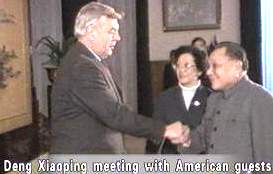 Deng Xiaoping met with them in the Great Hall of the People.Among them were former correspondents of the New York Times and the Associated Press.Peter Rand was a research fellow of East Asia Institute, Columbia University. He represented his deceased father.
Deng Xiaoping met with them in the Great Hall of the People.Among them were former correspondents of the New York Times and the Associated Press.Peter Rand was a research fellow of East Asia Institute, Columbia University. He represented his deceased father.
His father Christopher Rand was a correspondent of the New York Herald Tribune in China. In the 1970s, Peter discovered his father’s personal effects. He took a strong interest in his father’s experience in China.
From the well preserved notebooks, manuscripts and books about China, Peter felt that China had been so important for his father. He wanted to know why foreign journalists of one generation after another had been so fascinated by China and why they had taken risks in this country.
The meeting proceeded in a cozy atmosphere. Deng Xiaoping said that their work as journalists had rendered powerful support to the Chinese revolution and greatly helped the world understand China. He extended a warm welcome to the old friends of China and hoped that they would tour various places of the country. He said, “You will be astonished by the changes in China.”
Their revisit to China started from Beijing. Then they went to Yan’an, Xi’an, Chongqing, Wuhan, Nanjing and Shanghai, places holding important positions in the annals of China in the 20th century.
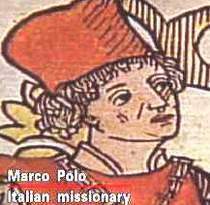 It seems everything should begin with a romantic Italian. About 700 years ago, 17-year-old Marco Polo came to China with his father carrying a letter from the Pope. They travelled along the Silk Road, crossed the Pamirs and entered Xinjiang. Opened during the Western Han Dynasty in the second century B.C., the Silk Road extended to Central and West Asia and then Europe. A huge amount of Chinese silk was carried to the West. The vast desert and the romantic caravans told mysterious stories of the Oriental civilization.
It seems everything should begin with a romantic Italian. About 700 years ago, 17-year-old Marco Polo came to China with his father carrying a letter from the Pope. They travelled along the Silk Road, crossed the Pamirs and entered Xinjiang. Opened during the Western Han Dynasty in the second century B.C., the Silk Road extended to Central and West Asia and then Europe. A huge amount of Chinese silk was carried to the West. The vast desert and the romantic caravans told mysterious stories of the Oriental civilization.
Marco Polo travelled across mountains and rivers for three and a half years before he arrived in Dadu, the capital of the Yuan Dynasty. During his stay in China for 17 years, he learned horsemanship and archery and visited other countries as a representative of China. No wonder the traveler from Venice acclaimed the large number of prosperous cities in China. After he returned to his homeland, he wrote The Description of the World, a book very popular in Europe. Copies of 70 translated versions of The Travels of Marco Polo found their readers worldwide. He featured a splendid and poetic age-old country in the East.
Before he died, Marco Polo said: “What I told you was less than one half of what I had seen.”
Before the 16th century, most Europeans knew little about China. In 1570, The Great Empire of China, the first complete book about China, was published in Europe. The Empire of China became a prosperous and superb empire in the eyes of the Westerners. The book described China as the largest country where the emperor ruled the vastest land and largest population in the world. It noted that the powerful empire had been the country with the best reign in the world so far and discovery of this civilization would undoubtedly change the whole world.
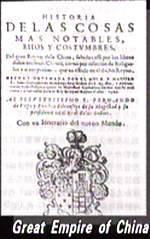 On the threshold of the 17th century, an Italian missionary by the name of Matteo Ricci travelled for three years before he entered China. In 1600, he took a boat in Jiangsu and came to Beijing by the canal. He was received by the emperor of the Ming Dynasty. During his stay in China for 30 years, Matteo Ricci wore Chinese clothes, followed Chinese rites and spoke Chinese. His tour of China was known as a Christian expedition to the East.
On the threshold of the 17th century, an Italian missionary by the name of Matteo Ricci travelled for three years before he entered China. In 1600, he took a boat in Jiangsu and came to Beijing by the canal. He was received by the emperor of the Ming Dynasty. During his stay in China for 30 years, Matteo Ricci wore Chinese clothes, followed Chinese rites and spoke Chinese. His tour of China was known as a Christian expedition to the East.
Built in 1442, the Ancient Observatory in Beijing was a major astronomical observation post during the Ming and Qing dynasties. Many Western missionaries settled here first after they arrived in China. Their work was closely related to the revision of calendar, observation of celestial phenomena and making of astronomical instruments. It was here that Matteo Ricci found the key to the door of China which had been closed for a long time. China paid much attention to celestial phenomena and calendar. It was attracted by the advanced astronomical knowledge and instruments from the West. Matteo Ricci was the first man who made Western astronomical instruments in China.
Almost ten years after the death of Matteo Ricci, German missionary Johann Adam Schall von Bell came to China. To gain the confidence of the newly-established Qing government, he presented a memorial to Emperor Shunzhi. He predicted that a solar eclipse and a lunar eclipse would take place simultaneously on September 1, 1644. Chinese calendar officials predicted another time. Emperor Shunzhi decided to verify it on the spot. A special contest was performed at the Ancient Observatory. The night there had never been so long. People looked up at the sky, waiting for the mysterious moment. The German missionary’s prediction came true. The black shadow began to gobble up the moon. The Western science and technology got the upper hand. A foreign missionary became the head of the Directorate of Astronomy of the Qing Dynasty.
When the Qing Dynasty, the last feudal dynasty in China, was established at the middle of the 17th century, the bourgeois revolution in Europe began. The roar of machines shook the handicraft workshops. The invention of the steam engine proclaimed the beginning of a new era. When the Western countries were taking big steps towards capitalism, the Qing empire was entirely unaware of the historic evolution in the world.
For 500 years, Western missionaries acted as pioneers entering China. Of course, they paid dearly for their mission. One missionary said: “We decided to enter China in any way. But the question is what way should be used.”
Britain accomplished the Industrial Revolution first and grew into the biggest power in the West. As a colonial empire, it was eager to seek raw materials and markets abroad. The tide of Western capitalism crossed the Atlantic Ocean and reached the sleeping empire in the East.
The first contact was friendly and cautious. On September 26, 1792, five big ships carrying a diplomatic mission left Portsmouth and sailed westwards. At the same time, the Chinese side received a letter from the British side. It noted that the British King had decided to send George Macartney as a special envoy with full authority to visit Peking in order to promote friendly exchanges between the courts of the two countries and develop trade relations beneficial to both countries.
A painter accompanying George Macartney recorded what they saw and heard during their tour of China. Everything in China seemed to be strange and hard to understand. They said that the civilization of the age-old empire was mature and perfect, but hesitated to move forward.
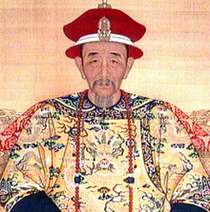 After a voyage of 10 months, members of the mission saw Emperor Qianlong in Chengde. It was a dramatic and symbolic visit, a meeting of a Western power with the biggest power in the East. The rulers of China thought that Britain had sent an envoy across the ocean to offer birthday congratulations to the Chinese emperor because it admired the Chinese civilization.
After a voyage of 10 months, members of the mission saw Emperor Qianlong in Chengde. It was a dramatic and symbolic visit, a meeting of a Western power with the biggest power in the East. The rulers of China thought that Britain had sent an envoy across the ocean to offer birthday congratulations to the Chinese emperor because it admired the Chinese civilization.
In June 1840, a fleet of 40 warships and 4,000 soldiers landed at Guangzhou, south China. It defeated 20,000 crack troops of the Qing Dynasty. Two opium wars and the Sino-Japanese War of 1894-1895 occurred in half a century. The age-old empire was routed in the gunfire of the big powers. An American historian in the 19th century observed that a drastic change of feeling had occurred. He said a new impression prevailing in the United States and Europe was that China was decadent, moribund and had fallen from its past splendour.
The door of China was opened. An age-old, closed and self-important country began its difficult historical travel in the collusion of Eastern and Western culture and the mutual infiltration of modern and traditional mores.
At the dawn of the 20th century, the World’s Fair in Paris showed a good many dazzling inventions. In the last 30 years of the 19th century, the global journalistic revolution reached its climax and spread to China. The journalistic revolution changing the world would necessarily change China.
In 1875, American scientist Alexander Graham Bell invented the telephone. Six years later, telephone service was introduced into China by a London telephone company.
Shanghai became a news centre of the West in the Far East. In 1815, Robert Morrison, a missionary from London, launched the first Chinese-language newspaper Monthly Statistics of Common Customs. In 1891, British missionary Timothy Richard turned the Chinese Globe Magazine into a real newspaper. In 1861, the Shanghai Shin Pao, the first Chinese-language newspaper in Shanghai, was launched. Very soon it had the largest circulation among the Chinese-language newspapers. In 1872, the Shun Pao began its brilliant line of business for half a century. Turbulent China attracted more and more foreign news media.
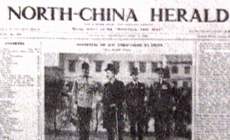 In 1850, the North China Herald was launched in Shanghai. In 1864, it was turned into the North China Daily News and became the most popular newspaper in the Shanghai concessions. Between 1815 and 1894, a total of 32 Chinese-language newspapers and magazines were published in Shanghai.
In 1850, the North China Herald was launched in Shanghai. In 1864, it was turned into the North China Daily News and became the most popular newspaper in the Shanghai concessions. Between 1815 and 1894, a total of 32 Chinese-language newspapers and magazines were published in Shanghai.
In the 1920s, world-famous media sent correspondents or special reporters to Beijing, Shanghai and other places to cover the volatile situation in China. AFP correspondents came to Shanghai in 1917. TASS correspondents came to China in 1921. UPI entered China in 1922. AP established its China bureau in 1926.
These journalists had to take risks. They closely watched the developments in China with their superior sensitivity. Most of them were involved in Chinese politics and became experts on China. Their views and inclinations were not identical and even belonged to different camps. But they were all important witnesses to many events in China.
Eighty-five-year old Israel Epstein is a legendary figure among the foreign journalists in China. In the 1930s, he began to cover events in China for UPI and other media and witnessed the fast-changing situation in China. He settled down in China in the 1950s. He forged an indissoluble bond with the Chinese revolution.
Like Epstein, many foreign journalists had their experiences in China as the turning point in their life. China was a cradle of famous journalists.
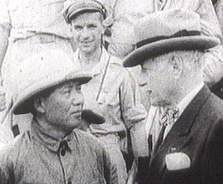 Morrison came to China in 1894 as a correspondent of the British newspaper The Times. He was known as the most experienced and outstanding old China hand. When the eight-power allied forces invaded Beijing in 1900, he was the first to deliver a crisis dispatch, playing a key role for Britain to send its expeditionary army. In the days of the Republic of China, he acted as a political advisor for Yuan Shikai. After his death, he was known as “China’s Morrison”.
Morrison came to China in 1894 as a correspondent of the British newspaper The Times. He was known as the most experienced and outstanding old China hand. When the eight-power allied forces invaded Beijing in 1900, he was the first to deliver a crisis dispatch, playing a key role for Britain to send its expeditionary army. In the days of the Republic of China, he acted as a political advisor for Yuan Shikai. After his death, he was known as “China’s Morrison”.
When he came to China in 1903, William Donald felt that the oldest and most unfamiliar country was writing the top story of the press. He took part in many important events in China’s political arena from the Revolution of 1911 to the War of Resistance against Japanese Aggression. A Western commentator said that nobody could rival him who had played such an important role in a country he did not belong to.
Edgar Snow probed the Chinese people and their cause of liberation. He said his conclusion was that China had been suddenly awakened by something. After he made an adventurous tour of northwest China and interviewed the Red Army, Edgar Snow wrote his epoch-making masterpiece Red Star Over China. He was known as the most outstanding journalist in those years. His stay in northern Shaanxi Province marked the starting point of his immortal achievements.
In the 1970s, he mounted the rostrum of Tian’anmen at the invitation of Mao Zedong. In the West it was believed to be an important signal of China’s intention to seek friendship with the United States. Before his death he said: “I love China.”
Helen Foster Snow said that China’s arduous task could only be accomplished with efforts. She came to China at the most critical moment and joined her husband Edgar Snow in the historical process of the Chinese revolution. They personally participated in the well-known December 9th Movement and stood firmly with Chinese students in the White terror. Helen’s exclusive interview with Zhang Xueliang made a great stir in the world. After her interviews in Yan’an, she wrote the sequel to the Red Star Over China.
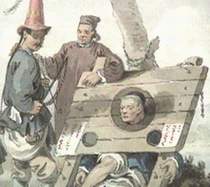 James Bertram came to China in 1936 as a correspondent of the British newspaper The Times. While he stayed at Yanjing University, he became a good friend of Edgar Snow and his wife. During the Xi’an Incident, he worked for 44 days and wrote the book China’s Crisis. He was said to be the man who had really discovered the turning point in modern China.
James Bertram came to China in 1936 as a correspondent of the British newspaper The Times. While he stayed at Yanjing University, he became a good friend of Edgar Snow and his wife. During the Xi’an Incident, he worked for 44 days and wrote the book China’s Crisis. He was said to be the man who had really discovered the turning point in modern China.
Agnes Smedley said very often that she had been to many countries, but wherever she went, she was a foreigner, but only when she was in China, she did not feel she was a foreigner. She gave true pictures of the misery in China and the struggle for a new China. She wrote most about Zhu De . She was known as a staunch supporter and advocate of the Chinese Communist Party.
Theodore White said that he had been brought to China by the god of good fortune. He stayed in China for six years between 1939 and 1945. Because of his remarkable coverage of China, he became the chief correspondent of the Time weekly in the Far East. When U.S. President Richard Nixon visited China in 1972, Theodore White, who was almost 60 years old, appeared again among the correspondents.
Anna Louise Strong first visited China in 1925. She came again on five other occasions. Her book China’s Millions introduced the Chinese Communists to the West. In the 1940s, people all over the world got to know from her report Mao Zedong's dictum "all reactionaries are paper tigers." In 1958, 67-year-old Anna Louise Strong settled in China. Twelve years later, she died in Beijing and began her eternal sleep on the soil she loved deeply.
A century had passed. These journalists have become part of the Chinese history. Their comrade-in-arms Israel Epstein was already 85. He had crossed two centuries in China. Today, a group of his old friends got together again.
The elderly people were very excited when they talked about people and things in the old days. With their shaking hands they wrote the title of this film. They felt as if they had returned to the bygone years as eyewitness to history.
|